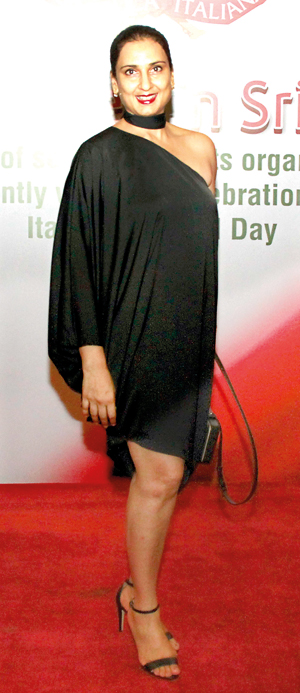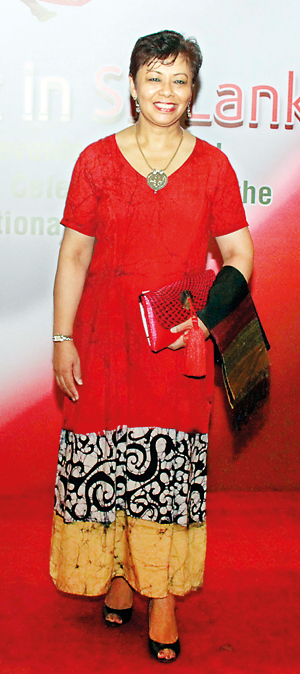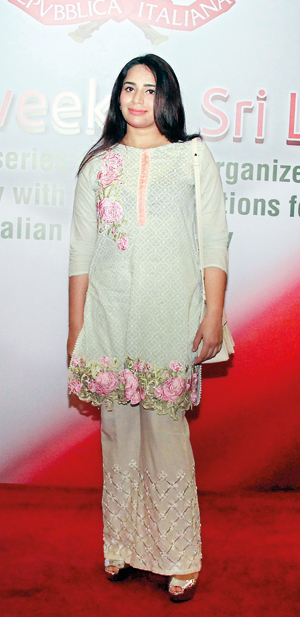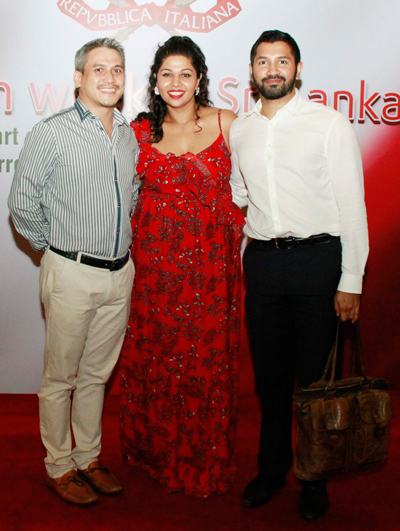Hitting a celebratory note with an operatic concert
View(s):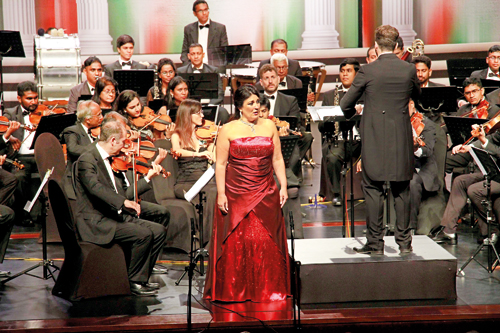
Italian magic: Soprano Silvana Froli and conductor Sipari di Pescasseroli
The Embassy for Italy in Sri Lanka hosted “Homage to Great Italian Opera”, as part of what was termed “Italian Week in Sri Lanka”, and presented an evening of musical performance at the Nelum Pokuna Mahinda Rajapaksa Theatre. A generous concert programme featured the Italian conductor Sipari di Pescasseroli and the Italian soprano Silvana Froli, along with seven orchestral players from Italy too, who augmented the Colombo based ensemble known as the National Unity Orchestra. Included in the mix was the singing duo the de Lanerolle Brothers.
The bill of fare included well-known arias from a strictly Italian operatic repertoire and some art songs, interspersed with orchestral works, which again, were intimately tied to famous Italian operas, pieces such as Intermezzos or Overtures.
Ambassador Bartorelli of Italy as the host of the evening, shared a telling message at the outset; after acknowledging the presence of the Prime Minister of Sri Lanka, he observed that when things go wrong and there is despair to contend against, music is a principal means of overcoming such burdensome times, and that music has the capacity to draw people of disparate backgrounds toward a common purpose and vision. He recognized that such a phenomenon has already taken place in the few days amongst the artistes from Italy and those from the Lankan community, as they prepared in collaboration for the evening’s celebratory concert. This ‘first time’ event, he hopes will continue to serve as a benchmark for future cultural activity between countries.
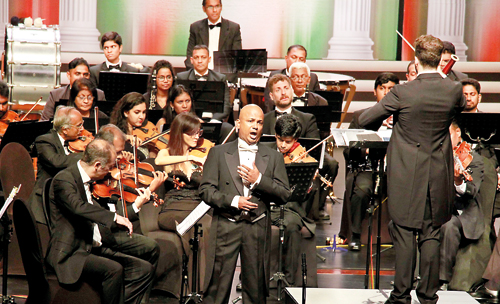
Rohan de Lanerolle in performance. Pix by Indika Handuwala
Although a fresh name has been invoked for this ensemble, the National Unity Orchestra comprises many of the names and faces we know and who are constituents in the several orchestral groupings we already have, such as the Symphony Orchestra, the National Youth Orchestra and the Krasna Ensemble and so on! Conductor Sipari, however, presented a rare phenomenon, with his animated style with the baton and the sheer exuberance with which he exhorts his players, using unaccustomed histrionics and gestures from the podium, and on occasion, even leaping vertically, not unlike the Masai of Kenya! (The polar opposite of the subdued maestro Bernard Haitink!)
The conductor’s personal dynamism seems to have borne some fruitage, where the ensemble performed with aplomb and relish in the Overture to “La Gazza Ladra”, and to my wonderment, with much feisty flair in Rossini’s overture to “William Tell” played prestissimo, and they appeared to have been in control through the careening rhythm and time while still honouring expression and dynamics! These pieces were in the second half, and in contrast with the first part, there seemed to have been more relaxed and more musically focused performances in the later section.
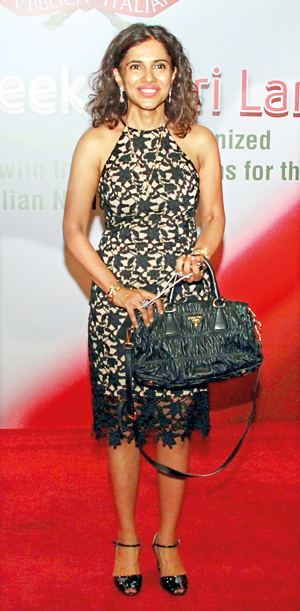
Opera lovers at the show
Soprano Froli is recognised for her interpretation of operatic works by Puccini (even as the conductor mentioned to us), and she and maestro Sipari have collaborated over several years. They both have been featured across several Eastern European nations and their orchestras, and in fact, not so long ago, had presented a very similar programme to the one here, in the capital of Qatar in Doha.
The Puccini arias that she performed in Colombo on June 6th were selected from among her favourite roles in her repertoire. One can sense that hers was the kind of voice that would have soared to fill a concert auditorium with clarity and incisive intonation when in her prime. She did offer us a sample of such verve and flourish during the encore, ere the close of the programme, when she, joining the De Lanerolle Brothers, launched into a rambunctious treatment of O Sole Mio, and she actually held the orchestra suspended for a moment as she launched into an impromptu ornamented vocal re-entry of the lyric, which she delivered with dramatic power and relish, to the delight of all as she ‘rode over’ the sumptuous orchestral sound!
Whether it was Nelum Pokuna Theatre’s ambience or lack of it is uncertain, and if it may have intimidated the singer in some way from achieving a vocal brilliance usually projected with those roles. However, with the dark and brooding dramatic aria “Sola, Perduta e Abbandonata” (from “Manon Lescaut”) she communicated with purpose and panache. That too, was included in the second half, which seemed the better half.
Rohan de Lanerolle weighed-in as a soloist in the first half, with Germont’s aria“Di Provenza il mar il suol” from Verdi’s Traviata. This is a baritone part and is an aria demanding careful and discerning phrasing (with perfect breathing technique) to combine the musical with the emotion of the moment. The singer usually would need to be a darker, mature, dramatic voice, given the grave nature of the scene. De Lanerolle’s is a light, more lyrical baritone, even a tad close to the tenor range. However, when Rohan returned on stage at the end of the show to join brother Ishan (who possesses a lower more subdued baritone) and they sang an arrangement for two voices of Leoncavallo’s party piece “Mattinata”, Rohan was more convincing in the tenor range and was better able to convey the emotion along with the power at his command. (As far as I am aware, Leoncavallo wrote this song about 115 years ago, with tenor-immortal Enrico Caruso in mind!!)
-Arun Dias Bandaranaike
